

The Note to Self podcast presents a 5-day plan to take back your digital identity. Copy of Would You Rather #DigCit - Google Jamboard. Essential Guide to Digital Citizenship for CIPA and E-Rate. What is E-rate?
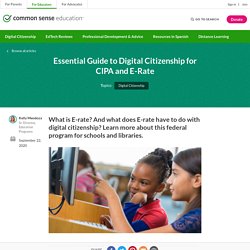
And what does E-rate have to do with digital citizenship? Learn more about this federal program for schools and libraries. E-rate is complicated. But complying with the Children's Internet Protection Act (CIPA) -- a requirement of E-rate -- doesn't have to be. Common Sense Education created this essential guide to help your district or school address the key topics E-rate recipients need to teach students, including internet safety, appropriate online behavior, and cyberbullying.
Real Online Privacy for Beginners: 60+ Essential Tips and Warnings. Companies and governments are spying on you all over the internet and beyond.
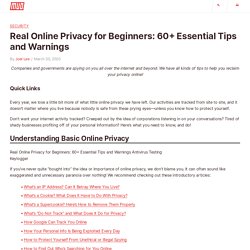
We have all kinds of tips to help you reclaim your privacy online! Quick Links Advertisement Every year, we lose a little bit more of what little online privacy we have left. Our activities are tracked from site to site, and it doesn’t matter where you live because nobody is safe from these prying eyes—unless you know how to protect yourself. News and Media Literacy Resource Center. Digital Citizenship Resources for Family Engagement. Media Balance & Well-Being English | Spanish | More Languages (Arabic, Chinese, Farsi, Korean, Russian, Tagalog, Urdu, Vietnamese) Privacy & Security English | Spanish | More Languages (Arabic, Chinese, Farsi, Korean, Russian, Tagalog, Urdu, Vietnamese) Digital Footprint & Identity English | Spanish | More Languages (Arabic, Chinese, Farsi, Korean, Russian, Tagalog, Urdu, Vietnamese) Relationships & Communication English | Spanish | More Languages (Arabic, Chinese, Farsi, Korean, Russian, Tagalog, Urdu, Vietnamese) Cyberbullying, Digital Drama, & Hate Speech English | Spanish | More Languages (Arabic, Chinese, Farsi, Korean, Russian, Tagalog, Urdu, Vietnamese)
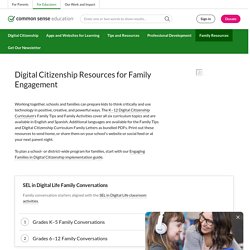
My Social Media Life. Internet Catalogue. eSafety Commissioner. SWGfL Digital Literacy - Curriculum Overview. This resource is no longer being updated and may not reflect current policy.
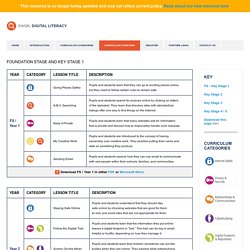
Read about our new resource here. Return to the Top KEYFS / Key Stage 1Key Stage 2Key Stage 3Key Stage 4 / 5Download this page (PDF) Digital Literacy. ProjectEVOLVE. SWGfL Digital Literacy - Home. Privacy. Digital Citizenship. Digital Citizenship Curriculum. Free Online Safety Policy Templates for Schools. Why K–12 Students Need to Be Taught to Guard Their Data Online. A recent McAfee survey of 1,000 college students and recent graduates ages 18 to 25 revealed some startling statistics on how little this tech-savvy cohort knows about data security.
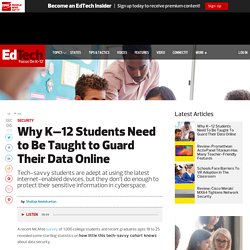
As many as 80 percent of students surveyed said either they or a friend or family member had been affected by a cyberattack. Despite that, 43 percent said they believed that they wouldn’t ever be a victim of a cybercrime. The consequence? Shockingly poor data hygiene. Just over half (53 percent) of students surveyed had security software on their computers, only 37 percent had smartphone protection and an even lower number, 14 percent, had some security installed on their tablets.
DigCitCommit. How to Nurture Global Digital Citizenship and Why it Matters to the World. One of the questions we’re asked most often is “what is a global digital citizen?”
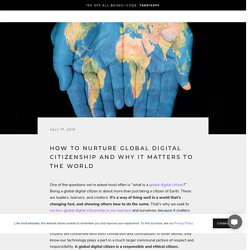
Being a global digital citizen is about more than just being a citizen of Earth. These are leaders, learners, and creators. It’s a way of living well in a world that’s changing fast, and showing others how to do the same. Protect Kids on the Internet. Computers are wonderful learning tools, but they can also expose children to dangers like unwanted content and inappropriate contact from adults through the Internet.
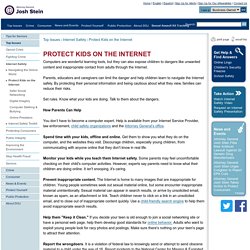
Parents, educators and caregivers can limit the danger and help children learn to navigate the Internet safely. By protecting their personal information and being cautious about what they view, families can reduce their risks. Set rules. Know what your kids are doing. eSafety: How to Keep Kids Safe Online - WhoIsHostingThis.com. Webwise - Internet Safety.
Internet Safety. NSTeens.org - Making Safer Choices Online. Home. Digizen - Home. InCtrl. Online safety advice & reporting. Netsafe – Online Safety Help and Advice for New Zealanders. MediaSmarts. Connected Learning in Libraries. 70% of employers are snooping candidates’ social media profiles. Scrolling through your photos from this past weekend and laughing at the debauchery of your Hangover-esque charades? Ranting about your current job or co-workers because you think you're just among "friends? " Think again. According to a new CareerBuilder survey, 70 percent of employers use social media to screen candidates before hiring, which is up significantly from 60 percent in 2016. So pause before you post – if you think it could be questionable or inappropriate, you should go with your gut.
So, what to flaunt vs. flop? Employers are searching for a few key items when researching candidates via social networking sites as good signs to hire: Information that supports their qualifications for the job (61 percent)If the candidate has a professional online persona at all (50 percent)What other people are posting about the candidates (37 percent)For any reason at all not to hire a candidate (24 percent) The bottom line? Student privacy report. Defending your rights in the digital world. Where Kids Find Hate Online. Be Internet Awesome - About. It's time to commit to digital citizenship! Digital citizenship is the new citizenship. I Found It On the Internet, It Must Be True: Fact vs. Opinion for Middle School Students. Actual text message exchange between one of the authors of this blog and her child: While this particular fun fact turned out to be entirely true, what caused a double take was the last little bit of this text exchange: “fun facts that I found on the internet.”
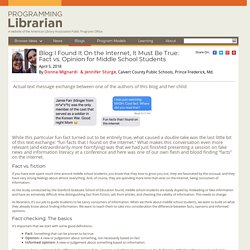
What makes this conversation even more relevant (and extraordinarily more horrifying) was that we had just finished presenting a session on fake news and information literacy at a conference and here was one of our own flesh and blood finding “facts” on the internet. Fact vs. fiction If you have ever spent much time around middle school students, you know that they love to gross you out, they are fascinated by the unusual, and they have very strong feelings about almost everything.
And, of course, they are spending more time than ever on the internet, being consumers of information. As librarians, it’s our job to guide students to be savvy consumers of information. Fact checking: The basics Teaching resources. Google for Education: Teacher Center. Be Internet Awesome - About.
Promoting Safety, Privacy & Security. 6 Degrees of Information. Netwars. Internet Safety & Digital Literacy. The Target is You!: Alcohol Advertising Quiz. 5 Reasons Why You Should Be Teaching Digital Citizenship. 6 of the Most Common Digital Citizenship Myths and Why They Aren't True. Scholastic. Digital Citizenship Agreements w COH WR. Google for Education: Teacher Center. How to Make the Move from Digital Citizenship to Digital Leadership. Teaching Global Digital Citizenship? Use These 10 Essential Questions. Teaching Global Digital Citizenship is all about asking the right questions.

Today kids are building the foundations of a digital culture. They are contributors, creators, communicators, and designers. Digital footprint? Try digital tattoo, experts say. Digital Citizenship Week 2017. 5 Ways to Check Who Is Tracking You Online. How much do you love online content? So much you pay for everything you can? Or do you, like the overwhelming majority of internet users, accept advertising and tracking as a way of life? The adage goes “if you’re not paying you’re the product,” and in the internet services and media era, this is truer than ever.
Finding out who and what is tracking you isn’t easy, but there are a number of sites and browser extensions that give you a little more clarity. Here are some of the best. Digital Citizenship. Digital Citizenship in Schools, Third Edition. NC Digital Learning Initiative. Leaders that understand the importance and possibilities for digital learning are key in making a digital transition successful.
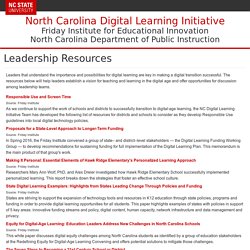
The resources below will help leaders establish a vision for teaching and learning in the digital age and offer opportunities for discussion among leadership teams. Responsible Use and Screen Time Source: Friday Institute As we continue to support the work of schools and districts to successfully transition to digital-age learning, the NC Digital Learning Initiative Team has developed the following list of resources for districts and schools to consider as they develop Responsible Use guidelines into local digital technology policies. Proposals for a State-Level Approach to Longer-Term Funding Source: Friday Institute In Spring 2016, the Friday Institute convened a group of state– and district–level stakeholders — the Digital Learning Funding Working Group — to develop recommendations for sustaining funding for full implementation of the Digital Learning Plan.
How to Evaluate a Website's Privacy and Security. The Real Truth About These Persistent Digital Citizenship Myths. The Real Truth About These Persistent Digital Citizenship Myths. Web Literacy Education for Educators. 12EssentialSkills. Video Lesson: Digital Footprint. Cybersecurity Knowledge Quiz. Google Partners with ISTE and Others to Create Digital Citizenship Game. With a growing number of digital tools entering the classroom, it is now more important than ever to make sure kids know how to navigate the internet.
This is likely why two of the biggest champions of ed tech — Google and ISTE — have teamed up to create a new way to teach digital citizenship. Be Internet Awesome, a program developed in concert with the Family Online Safety Institute, the Internet Keep Safe Coalition and ConnectSafely, educates kids about digital citizenship in interactive ways, including an online game. “To help kids learn these lessons in a way that’s fun and immersive, we created an interactive, online game called 'Interland',” writes Google’s Vice President of Engineering for Kids and Families Pavni Diwanji in a blog post.
6 underground apps students hide from schools. 1. Whisper: The app states users must be 17 years old to download the app. Even if children followed that age restriction, high school students can download and use it. The app lets users share their thoughts or opinions via text that is placed on top of an image. Users also can connect directly with one another. Balanced news, issues and opinions, media bias ratings, political news. False, Misleading, Clickbait-y, and Satirical “News” Sources.
5 Questions Students Should Ask About Media. Interested in helping students learn how to spot a stereotype on a TV show? Or how to identify bias in a news article? Are your students obsessed with becoming YouTube celebs? Digital Compass. Educator guide 093015. K-12 Digital Citizenship Curriculum. Information Security Primer for Evaluating Educational Software. The Information Security Primer for Evaluating Educational Software is a toolkit for people looking to learn more about evaluating the information security practices of educational software. While the primary audience for this document is people interested in running information security tests, our secondary audience includes people who will not be running tests but who want to learn more about what "information security" means. As the title states, this document is a primer, not a comprehensive guide.
Ally's Story - Second Thoughts on Sexting Video. Lesson in Action: Overexposed - Sexting and Relationships Video. Sexting handbook ce 1020 1. Digital Citizenship Toolkits. Digital Compass. Teens and Tech: The New Landscape Video. Tap here for our Free App! Get all our media picks, personalized for your kids. No thanks. 5 Email Etiquette Tips for Students - Some for Teachers Too. One of my pet peeves is receiving an email that from someone that just launches into a request without stopping to address me by name. For years I have told students that I won't reply to emails if they don't write "Hi Mr.
Digitalcitizenshipcertifiededucatorchecklistandfaq 1. 11 Essential Digital Literacy Skills. Calling All Parents and Educators of This Generation’s Digital Citizens. A few weeks ago, I was asked by a parent at my son’s school to share strategies on how to be conscious and aware of what their children were doing on the internet. This immediately brought back memories of one of my favorite webinars on digital citizenship. If you missed it, you don’t have to miss out because it’s featured in Discovery Education. Access it here. (Canadian Subscribers). K12 educational transformation through technology. Oct/Nov 2015 eSchool News. K-12 Digital Citizenship Curriculum.
NEW! Digital Citizenship Week 2015. Digital Citizenship Week: 6 Resources for Educators. Plan a "Digital Family Summit" to Engage Students and Parents. I recently had an opportunity to attend the first Digital Family Summit (DFS) in Philadelphia, Pennsylvania. Digital Citizenship: Resource Roundup.